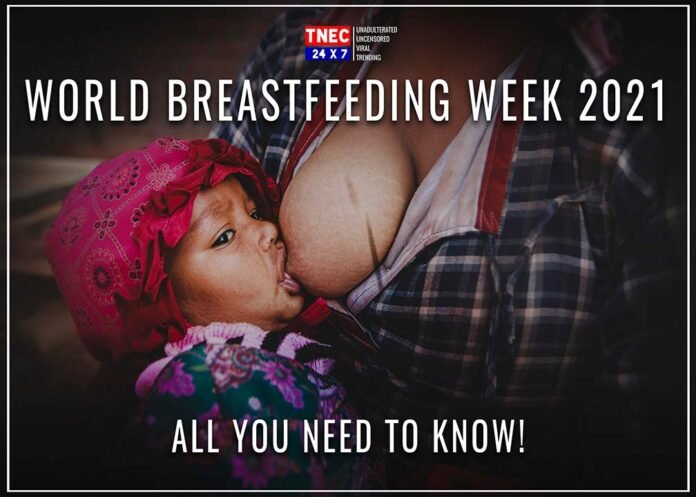Breastfeeding a baby is one of the most overwhelming experiences a mother can have and the most essential part of a newborn baby’s growing up journey. The World Health Organization (WHO) recognises breast milk as the best nutritional source for infants.

WHO says, babies should be exclusively breastfed for six months since the time of their birth and later should be introduced to different and appropriate food items after six months.
The World Breastfeeding Week is celebrated every year for a week from 1st August, the motive of this week is to create awareness among new parents and aims to inform, anchor, engage and galvanise action on breastfeeding and related issues.
The initiative was started in August 1990 by government policymakers, WHO, UNICEF, and other organizations to protect, promote, and support breastfeeding.
Also read: Women empowerment 2021: Saikhom Mirabai Chanu to be appointed as the Additional Superintendent of Police (Sports) by Chief Minister N Biren Singh
History of the day

World Breastfeeding Week is celebrated every 1-7 August in commemoration of the 1990 Innocenti Declaration.
World Breastfeeding Week started in 1992, with annual themes including healthcare systems, women and work, the International Code of Marketing of Breastmilk Substitutes, community support, ecology, economy, science, education and human rights.
However, this idea was supposed to be celebrated only for one day which afterward turned into a week. This week is known as World Breastfeeding Week and is celebrated from 1-7 August.
The week is celebrated in more than 100 countries. The first World Breastfeeding Week was celebrated on 19. Further since 2016, WBW is aligned with the Sustainable Development Goals.
In 2018, a World Health Assembly resolution endorsed World Breastfeeding Week as an important breastfeeding promotion strategy.
Significance of Breastfeeding
Breastfeeding is one of the most effective ways to ensure child health and survival. However, nearly 2 out of 3 infants are not exclusively breastfed for the recommended 6 months—a rate that has not improved in 2 decades.
Breast Milk is the ideal food for infants.
It is safe, clean and contains antibodies which help protect against many common childhood illnesses. Breast Milk provides all the energy and nutrients that the infant needs for the first months of life, and it continues to provide up to half or more of a child’s nutritional needs during the second half of the first year, and up to one third during the second year of life.
Breastfed children perform better on intelligence tests, are less likely to be overweight or obese and less prone to diabetes later in life. Women who breastfeed also have a reduced risk of breast and ovarian cancers.
Unfortunately, Globally, 3 in 5 babies are not breastfed in the first hour of life. Over 820 000 children could be saved yearly if all children 0-23 months were optimally breastfed. Only 41% of infants under 6 months of age are exclusively breastfed.
World Breastfeeding Week 2021 theme
World Breastfeeding Week 2021 focuses on how breastfeeding contributes to the survival, health and wellbeing of all, and the imperative to protect breastfeeding worldwide. The 2021 World Breastfeeding Week’s theme is ‘Protect Breastfeeding: A Shared Responsibility. The reason behind this theme is to make people aware of the benefits of breastfeeding and its importance.
COVID-19 and Breastfeeding
Amid the COVID-19 pandemic, there has been a lot of misinformation around breastfeeding.
The World Health Organisation states that “transmission of active COVID-19 through breast milk and breastfeeding has not been detected to date. There is no reason to avoid or stop breastfeeding.”
Additionally, a woman with confirmed or suspected COVID-19 can breastfeed if they wish to do so by following a few precautions. According to WHO, before breastfeeding, a mother should wash their hands for at least 20 seconds with soap and water.
In case of unavailability of water, one can use a hand sanitiser with at least 60 per cent alcohol content. Additionally, one should always wear a mask during any contact with the baby, including while feeding.











